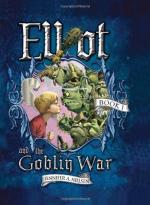“Wheesht, lassie!” he said brokenly. “Dinna you break doon noo, for you hae been the mainstay o’ us a’, when we wad hae lost heart often. I used to think that oor lot couldna be harder, when the bairns were a’ wee, an’ we were struggling frae haun’ to mooth, to see them fed an’ cled. But wi’ a’ the hardships, thae days were happy. We were baith young, an’ I was aye fairly healthy an’ when we locked the door at nicht, we were satisfied that a’ that belanged to us were inside, an’ in safety, even though their wee stomachs maybe werena’ ower fu’. But noo we canna do that, wife. Some hae gane to where want an’ poverty canna hurt them, an’ that is a consolation; but where will oor lassie be, that never gi’ed us a wrang word a’ her days? Is she in want this nicht, the same as we are oorsels? Will she be hungry an’ homeless, ill clad, an’ oot in the storm? If she is, then God peety her. If only we had her aside us, hunger wad be easier tholed for us a’,” and Matthew, unable to control himself longer, completely broke down and wept, mingling his tears with those of his wife, because of their misery and poverty and suffering.
The girl outside could hardly restrain herself at thus hearing her parents speak. She sobbed and held on to the window ledge, her eyes fixed greedily upon the open chink in the shutter, listening to, and looking at her parents in their misery, as they sat and talked so kindly and anxiously about her—talked so that every word was a stab at her heart; for she had never heard them open their hearts like this before.
“Ay, wife,” he said after a time, “it was a sair blow to me. I could hae fain dee’d at the time; I was fair heartbroken. It’s a gey queer world that brings the keenest pangs frae them that yin likes best. I could hae dee’d gladly to hae saved that bairn frae the slightest hurt!”
“Matthew,” said the mother, speaking with all her soul in her eyes, as she looked at him, “if by ony chance it should turn oot that Mysie gaed wrang an’ fell into disgrace, wad ye tak’ her back, if she should come hame again?” and there was a world of pleading in the mother’s voice as she spoke.
“Tak’ her back! Oh, God, I’d dae onything to hae her here at this meenit, nae matter though it should be proved that she was guilty o’ the warst sin under the sun. Tak’ her back! Oh, wife! my heart is breakin’ for her!” and he lifted his thin worn hand to his eyes and sobbed in his grief.
“Weel, Matthew,” returned the wife, “if ever she does come back, nae matter when it may be, or hoo it may be, I’m glad you’ll no be harsh wi’ her. You’ll just speak to her as if naething had happened; for I ken she’ll be mair feart to face you than onybody else. Jist try an’ mak’ her believe, when you speak, that she had gane awa’ to the store a message, or to the well for watter, an’ that she had bidden owre lang, as she an’ ither weans used to do when they got started the play, an’ forget to come hame. Jist speak to her that way, Matthew, an’ the hame-comin’, if ever it comes, will no’ be sae hard for the puir bairn. For God knows, it micht be hard enough for her!”




